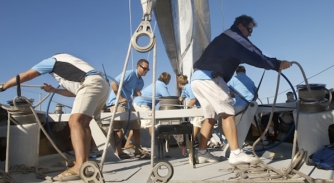Crew harassment prevention
Benjamin Maltby discusses the requirement later this year for employers to take “reasonable steps” to prevent sexual harassment of their employees…

Benjamin Maltby, General Secretary, The Owners Club
Yachts bring employees together in close proximity, for long periods, working under pressure, like no other. Employers have always owed crewmembers various duties of care, but recent British legal developments oblige owners to be proactive in preventing sexual harassment. Prevention is better than cure. While these changes only apply to a minority of yachts and crewmembers, it’s a step in the right direction and provides a useful industry benchmark.
Seven years on
It’s hard to believe that the #MeToo movement began way back in October 2017. And it’s by October 2024 that employers will have to abide by a set of new rules aimed at preventing sexual harassment in the workplace. The hashtag exposed not only the staggering scale of the problem but how the law was failing employees at every stage. It’s shameful that it’ll have taken seven years. But here we are.
The present position
The Maritime Labour Convention (applicable only to chartered yachts) already mandates that signatory states should take account of the latest version of the Guidance on eliminating shipboard harassment and bullying jointly published by the International Chamber of Shipping and the International Transport Workers’ Federation. That guidance does contain an example policy on general harassment, but it is so vague as to be almost meaningless.
The Equality Act 2010 defines sexual harassment as any unwanted conduct of a sexual nature, which has the purpose or effect of violating dignity or creating an intimidating, hostile, degrading, humiliating or offensive environment.
Those on the receiving end can bring an employment tribunal claim against their employer (and/or a court claim against their harasser). It’ll then be for the employer to demonstrate that they took “all reasonable steps” to prevent the harassment. In practice, it’s an uphill task to prove that such steps were taken.
The new duty
The Equality Act 2010 was amended in late 2023, so that from 26 October 2024 onwards all employers must take “reasonable steps” to prevent sexual harassment of employees in the course of their employment. “Sexual harassment” means being subjecting someone to unwanted conduct of a sexual nature – and what constitutes that is for the tribunal to decide on the facts.
Of course, sexual harassment is already outlawed, but employers are now under a positive duty to take reasonable steps to prevent it. An allegation of no such steps having been made, employers and are on the backfoot and must prove that they did indeed take such steps. And the new law is non-specific about from whom the crewmember must be protected. So as well as seeking to avoid harassment from fellow crew, reasonable steps must be taken to prevent crewmembers falling victim to unwanted sexual conduct by, say, charter guests.
As well as awarding compensation, an employment tribunal may also apply a further uplift of up to 25 per cent where it’s decided that the employer failed to take reasonable steps. This uplift applies to all the compensation awarded for any harassment (whether sexual or not). If the crewmember succeeds in a claim on multiple instances of various types of harassment, the uplift could have a significant effect.
Application to crew
Broadly, British employment law applies to crewmembers (including captains) ordinarily working in Great Britain. Visiting crews aren’t usually covered. For those working elsewhere, their employment arrangements are key. The law distinguishes between “peripatetic” crew, working on rotation, whose base is in Great Britain and from where they begin their “tours of duty” (who are covered by British employment law) and “expatriate” crew, who live and work abroad. The latter are unlikely to be covered, unless there’s a “sufficient connection” with Great Britain – just holding a UK passport isn’t enough.
Employees who do not fit into the above categories, but who have “equally strong” connections with Great Britain and British employment law, might also be covered. There was found to be a sufficient connection, even where a crewmember was employed by a company based outside the UK, on a vessel which never entered UK waters, merely where her salary was paid into a UK bank account, she accounted to HMRC for tax, and the employment agreement was subject to English law and jurisdiction.
More specifically (according to the poorly-drafted Equality Act 2010 (Work on Ships and Hovercraft) Regulations 2011) the relevant parts of the Equality Act 2010 apply to any crewmember working (wholly or partly) within Great Britain or adjacent waters, where:
• The yacht is UK-registered and has a homeport in Great Britain, or
• The yacht is EEA member state-registered, and the crewmember is a citizen of Great Britain or of an EEA or designated state, and the legal relationship of the crewmember’s employment is located within Great Britain, or the crewmember retains a sufficiently close link with Great Britain.
The relevant parts also apply to any crewmember working outside Great Britain and adjacent waters, where:
• Where the crewmember is working on a yacht which is UK-registered and has a homeport in Great Britain, and
• The crewmember is a citizen of Great Britain or of an EEA or designated state, and the legal relationship of the crewmember’s employment is located within Great Britain, or the crewmember retains a sufficiently close link with Great Britain.
Where the Act applies, the crewmember’s role, and the size or use of the yacht (private or commercial), are irrelevant.
And it doesn’t matter whether the contract is temporary or permanent – or even just on an informal, casual basis so long as the crewmember works on a personal basis. So dayworkers would be encompassed, but the employees of subcontractors would not.
What must be done?
The new law provides no steer whatsoever on what reasonable steps must be taken. Taking a risk-based approach, the tribunal would have before it a wealthy employer, employing typically young crewmembers, in a confined space, often working long hours and sometimes attending to guests whose inhibitions may have been relaxed by alcohol. So the tribunal’s expectations may be very high.
On-board cultures take time to change, and new policies take time to bed-in, so the time to start taking meaningful, tailored action is now.
Helpfully, the Equality & Human Rights Commission has produced some guidance. It’s not definitive, but an employment tribunal could use it as a starting point when considering what steps should have been taken. The seven-step guidance can be summarised, and adapted for owners and managers, as follows. Remember that record-keeping is essential.
Step 1: Develop an effective policy
The policy should state that:
• All crewmembers are in need of protection, and are subject to and protected by the policy
• Sexual harassment is unlawful and will not be tolerated
• Harassment or victimisation is likely to lead to disciplinary action up to and including dismissal, and
• Aggravating factors, such as abuse of power over a more junior colleague, will be taken into account in deciding what disciplinary action will be taken.
The policy should also:
• Define sexual harassment and provide clear examples of it - relevant to the environment of a professionally crewed yacht,
• Include an effective procedure for receiving and responding to complaints of harassment, and
• Provide a commitment to review the policy at regular intervals and to monitor its effectiveness.
The policy should go on to address third-party harassment, explaining clearly:
• That third-party harassment can result in legal liability on the part of the perpetrator and employer
• That it will not be tolerated
• That crewmembers are encouraged to report it
• What steps will be taken to prevent it, and
• What steps will be taken to remedy a complaint and prevent it from happening again.
Step 2: Engage your crew
Conduct regular crew interviews, anonymous surveys and exit interviews.
Captain, manager and the owner’s representative should have known open-door policies.
Make sure that all crewmembers are verifiably aware of:
• How they can report sexual harassment
• Your sexual harassment policy, and
• The consequences of breaching the policy.
Step 3: Assess and reduce risks
While many of these will be obvious, you should consider and record factors that might increase the likelihood of sexual harassment and the steps that can be taken to minimise them, such as:
• Where are the power imbalances?
• Is there job insecurity for a particular group or role?
• Are crewmembers working alone?
• Are guests drinking significant amounts of alcohol?
• Which crewmembers have guest-facing duties?
• Is there a lack of diversity in your workforce?
Step 4: Reporting
Implement a reporting system (an online or independent telephone-based service) that allows crewmembers to raise an issue (anonymously or not).
Explain clearly to all crewmembers:
• What is considered acceptable behaviour,
• How to recognise sexual harassment, and
• What to do if they experience or witness it.
Step 5: Training
Crewmembers should be trained on:
• What sexual harassment in the workplace looks like
• What to do if they experience it
• How to handle any complaints of harassment, and
• How to address third-party harassment from guests, suppliers, etc.
Step 6: Actioning a complaint
Act immediately to resolve the complaint, taking into account how the crewmember wants it to be resolved.
Respect the confidentiality of all parties.
Protect the complainant from ongoing harassment or being victimised or harassed further during an investigation.
If a crewmember makes a complaint of harassment that may be a criminal offence, you should speak to the individual about whether they want to report the matter.
Only use confidentiality agreements where it is lawful, necessary and appropriate to do so.
Always communicate the outcome of the complaint to the complainant in a timely manner.
Step 7: Dealing with third parties
Harassment by a third party, such as a guest or supplier’s employee, should be treated just as seriously as that by a colleague.
Employers should take steps to prevent this type of harassment, including putting reporting mechanisms in place or assessing high-risk workplaces where staff might be left alone with guests.
The upsides
Owners must not see this change in the law as making life more difficult for them and their captains and managers. (Lack of) crew retention is a thorny, ongoing and expensive issue. Social media groups allow crew (anonymously) to name and shame poorly-managed yachts where unacceptable behaviour goes unchecked. In turn, such yachts will struggle to hire good quality crew to replace those who’ve had enough. Sexual harassment can ferment a toxic on-board atmosphere.
By contrast, an inclusive and respectful working environment leads to happier crew and better owner and guest experiences.
NEW: Sign up for SuperyachtNewsweek!
Get the latest weekly news, in-depth reports, intelligence, and strategic insights, delivered directly from The Superyacht Group's editors and market analysts.
Stay at the forefront of the superyacht industry with SuperyachtNewsweek
Click here to become part of The Superyacht Group community, and join us in our mission to make this industry accessible to all, and prosperous for the long-term. We are offering access to the superyacht industry’s most comprehensive and longstanding archive of business-critical information, as well as a comprehensive, real-time superyacht fleet database, for just £10 per month, because we are One Industry with One Mission. Sign up here.
Related news

Bridging the age gap
As the industry grapples with a talent crisis exacerbated by an age gap, World Boating Day aims to showcase industry intricacies and attract new talent
Crew

Are crew lacking leadership?
Despite some efforts being made to improve mental health on board, little has changed. Can senior leaders do more to truly turn the tide?
Crew

No respite in crew mental health cases
ISWAN has reported a dramatic 58% quarter-on-quarter increase in calls to Yacht Crew Help, with women being affected disproportionately
Crew

Millions marked for unpaid crew
Nautilus secured over a million euros in unpaid wages for crew in 2023, but this year could see the union gain millions more in a single settlement
Crew

Good People on Good Boats
The simple mantra of Rooster Recruitment has resonated. Ex-yachtie and Director Jack Greene joins SuperyachtNews to reflect on three years in business
Crew

Talking about our next generation
The problems of procuring and retaining new talent in the industry were painfully evident during Lürssen's TSF: Connect session
Crew
Related news
Bridging the age gap
1 year ago
Are crew lacking leadership?
1 year ago
No respite in crew mental health cases
1 year ago
Millions marked for unpaid crew
1 year ago
Good People on Good Boats
1 year ago
Talking about our next generation
1 year ago
NEW: Sign up for
SuperyachtNewsweek!
Get the latest weekly news, in-depth reports, intelligence, and strategic insights, delivered directly from The Superyacht Group's editors and market analysts.
Stay at the forefront of the superyacht industry with SuperyachtNewsweek



